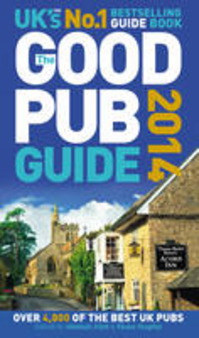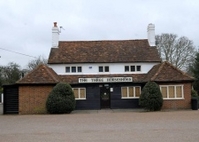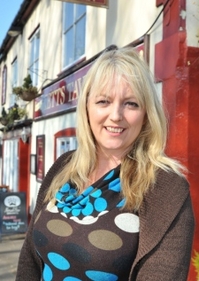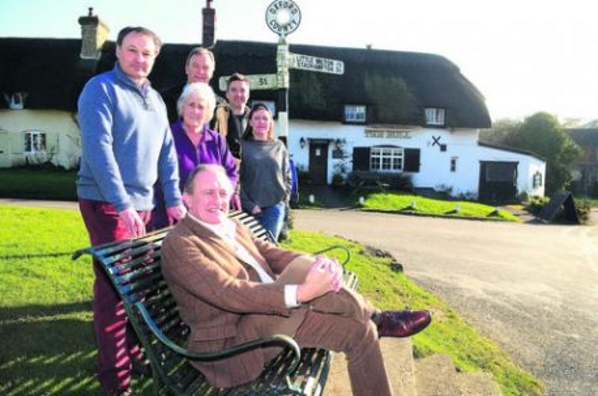Time to stand up for the Great British Pub
Added: Sunday, September 1st 2013
Just three days after the CBI – the Confederation of British Industry – reported a recovery in the pub trade, the Good Pub Guide’s editors declared in the 2014 edition that between 2,500 and 4,000 pubs should close in the following 12 months.
The editors, Alisdair Aird and Fiona Stapley, didn’t say that a number of pubs might close or could close -- they said they will be forced out of business and “it is high time that they closed their doors”. Fiona Stapley added: “Pubs closing keeps the trade healthy and robust.” She described outlets that deserve to close as “bad pubs at the bottom of the pecking order”.
According to the CBI, many publicans were reporting an 11% increase in trade so far this year while 28% were optimistic about their opportunities in the future. At present, around 26 pubs a week are closing but if the guide’s editors had their way that figure would rocket. If you take their top figure of 4,000 pubs, that would mean a weekly closure rate of 76 a week – close to three times the current rate.
The guide set its stall out when it was first published in the 1980s and its style has never changed. Its focus is food-led pubs, mainly in rural and suburban locations. The up-market nature of the main entries was underscored two years ago when the guide introduced payments for its main entries, ranging from £99 for a short entry to £200 for a specially featured pub. At a time when pubs were suffering at the height of the recession, there was outrage at the decision and many publicans refused to pay and queried the integrity of a guide that offered editorial in return for payment.
The 2014 edition of
the Good Pub Guide calls for
pubs "at the bottom of
the pecking order" to close

‘Bad pubs’ – who decides?
Around 5,000 pubs have closed in the past five years and it’s likely that many poorly-run ones will have disappeared but others have been victims of outside forces. Of the remaining stock of 49,500 pubs, who is to decide what is “bad”? It’s a definition that’s simplistic and often wrong. Many pubgoers may be perfectly happy with a simple ale house that serves a good pint and perhaps a sandwich or a pie. Not everyone wants – or can afford – to go to a pub with expensive food.
The desire for pubs serving good beer and a short food menu is not confined to what the guide calls outlets “at the bottom of the pecking order”. The Three Horseshoes in Harpenden, Herts, is everything that should appeal to the editors of the Good Pub Guide. It’s an attractive, listed building in a semi-rural location on West Common, adjacent to a large golf course. Harpenden is an affluent town and the owner of the Three Horseshoes, Enterprise Inns, decided to turn the pub into a gastro-eatery. It failed and has closed. Locals told the Herts Advertiser they want their "country pub back".

The British pub is horses for courses. There are pubs to suit all needs. There are pubs that offer fascinating history and stunning architecture. Others are community pubs serving a distinctive local area where the publicans know their customer base well and meet their demands. Yet more will offer specific services, such as sport, ranging from darts and pool to running cricket and football teams. Some have their own theatres and – increasingly – their own small, in-house breweries.
Three Horseshoes in
Harpenden: failed as
as a gastro-pub
When Fiona Stapley says “pubs can’t just open for lunch and open again in the evening anymore” you have to query her knowledge of the trade. In the Hertfordshire section of the Good Beer Guide, 18 of the listed 66 pubs close in the afternoon. By her definition, these are “bad pubs” out of tune with the modern demands of the market. In reality, they are in rural locations where the publicans tailor their opening hours to customers’ needs.
Dawn Hopkins, who runs Ketts Tavern and the Rose in Norwich, said on BBC Radio 4’s Today last Thursday: “I’m appalled the Good Pub Guide has decided to publicise itself by slating the pub industry. Pubs are different things to different people. Yes, there are a few rubbish pubs out there but there are some very good pubs and publicans we have lost due to what is happening in the pub industry at the moment.”
Harsh economics
The editors do have the grace to acknowledge that their call for mass closures of pubs “will mean bad news for staff and regulars”. It means far more than that. Many bar staff are part time and will find it difficult to find other work. They are often young and will add to the number of youngsters swelling the unemployment queues.
Dawn Hopkins:
"Appalled that
Good Pub Guide
has slated the
pub industry"

Tenants and lease holders often live on the premises. If their pubs close, they will lose their homes as well as their livelihoods. They will also be out of pocket and face mounting debt. It’s the custom for tenants and leaseholders to pay a premium when they take over a pub. In some cases, this can amount to the equivalent of a mortgage on the property. If their pubs close they would hope to recoup that investment. But pub companies are swift to deduct large sums for alleged damage to the property and the need to refurbish the building. In extreme cases, when publicans are evicted, they lose everything.
Supermarkets, selling beer cheaper than bottled water to induce people to shop in their outlets, are undermining pubs, with no thought for the social consequences. Drinkers, in particular those on low incomes, will abandon the pub in favour of the supermarket where they can buy a case of lager for £8 or £9.
And the pub companies have a key role to play in pub closures. They are ruthless in closing pubs they consider to be unviable or charge rents that make them uneconomic for tenants and leaseholders. Another pub in Harpenden has closed not through lack of success but as a result of Enterprise Inns increasing the annual rent to £75,000 a year, leaving no income or profit for the tenant.
The pubcos can also be hopelessly wrong. In Ipswich, Enterprise deemed the Dove to be unviable. The sitting tenants, Adey Smith and Karen Beaumont, sank their savings and raised additional money to buy the Dove. It’s now the most successful pub in the town, with regular beer festivals and its own in-house brewery. But for their commitment, the Dove would have closed.

Saving pubs
Pubs play a vital community role and are the cement that holds communities together. This is recognised by parliament. Greg Mulholland MP’s Parliamentary Save the Pub Committee has support on all sides of both the House of Commons and the Lords. Its parliamentary motion supporting the Fair Deal for Your Local campaign – which wants reasonable levels of rent and the right for publicans to buy beer free of the pubcos’ tie – is the most supported motion in the current parliament.
The present coalition government recognises the key community role of the pub. Its Localism Act allows people to save pubs by getting them listed as Assets of Community Value. The act has been used in several parts of the country to save pubs threatened with closure. Enterprise Inns wanted to close the Ivy House in Nunhead, south London, and sell it to a property developer to turn into flats. The pubco was thwarted first by the local branch of CAMRA, which won a Grade-II listing for the Ivy House from English Heritage. Then a group of locals used the Localism Act to get a further listing from Southwark Council as an Asset of Community Value. The group formed a steering committee that eventually turned into a co-operative with shareholders. The co-op has raised the money through shares and loans to buy the Ivy House and refurbish it. It re-opened two weeks ago.
In Great Milton in Oxfordshire, the last pub in the village, the Bull, was put up for sale by Greene King in November 2011. The villagers (above) rallied and formed a co-operative to buy the pub. £250,000 was raised and the sum included a donation from celebrity chef Raymond Blanc, whose restaurant Le Manoir aux Quat’ Saisons in based in the village. Blanc said he was delighted to help save a community local.
The British Pub has survived plagues, Great Fires, revolutions, wars and recessions and will continue to please and refresh millions. It deserves our support.







